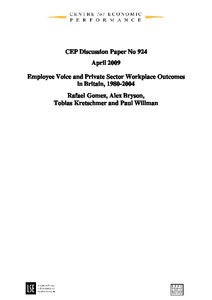Employee voice and private sector workplace outcomes in Britain, 1980-2004
"Non-union direct voice has replaced union representative voice as the primary avenue for employee voice in the British private sector. This paper provides a framework for examining the relationship between employee voice and workplace outcomes that explains this development. As exit-voice theo...
| Main Authors: | , , , |
|---|---|
| Institution: | ETUI-European Trade Union Institute |
| Format: | TEXT |
| Language: | English |
| Published: |
London
2009
LSE |
| Subjects: | |
| Online Access: | https://www.labourline.org/KENTIKA-19188128124919063009-employee-voice-and-private-sec.htm |
| Summary: | "Non-union direct voice has replaced union representative voice as the primary avenue for employee voice in the British private sector. This paper provides a framework for examining the relationship between employee voice and workplace outcomes that explains this development. As exit-voice theory predicts, voice is associated with lower voluntary turnover, especially in the case of union voice. Union voice is also associated with greater workplace conflict and poorer productivity. Nonunion voice is associated with better workplace financial performance than other voice regimes." |
|---|---|
| Physical Description: | 33 p. Digital |

